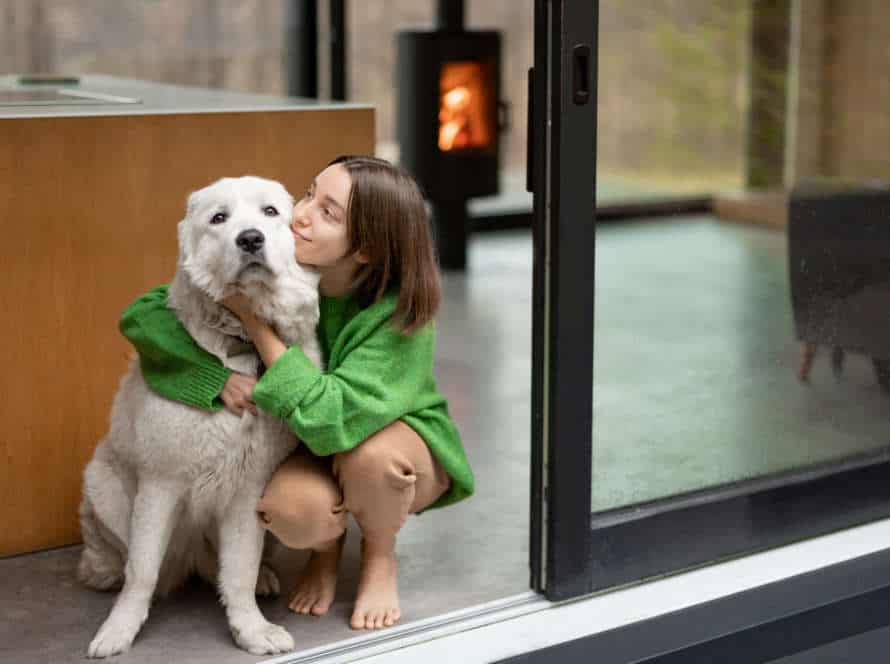Boredom Barking: When Your Dog Needs More Stimulation
Do you have a pup that’s prone to boredom barking? Here are a few tips to help your furry companion stay mentally and physically stimulated:
- Exercise – Get your dog active for at least 30 minutes every day. Running, walking and fetch are all great ideas!
- Mental Stimulation – Try puzzle toys or treat dispensers to keep your pup’s mind engaged.
- Training – Incorporate training sessions into your daily routine. It’ll help keep your pup’s mind active and improve their behavior.
- Socialization – Give your pup the chance to meet new people and dogs. This will help reduce boredom barking and provide socialization.
By following these tips, you can help your pup stay entertained and engaged!
Signs of Boredom Barking
Barking from boredom can be really irritating and mess with your daily life. Recognize the signs of boredom barking to do something about it. Common signs are a pup that barks all day, or more than usual. Certain breeds may be more likely to bark due to boredom. Let’s take a look at the signs and how to tackle them.
What is boredom barking?
Boredom barking is a type of vocalization that dogs use when they are feeling frustrated and restless. Signs of this include:
- Excessive barking when left alone.
- Barking during inactive moments.
- Destructive chewing/scratching of furniture/doors/walls.
- Digging holes in the yard.
- Running around house/yard aimlessly.
To prevent boredom barking:
- Exercise & playtime for your dog.
- Interactive toys/puzzles to keep them mentally stimulated.
- Positive reinforcement to learn new commands/tricks.
- Doggy daycare/dog walker to break up their day.
- Professional dog trainer/behaviorist if the barking persists.
When does boredom barking become problematic?
Barking is a normal thing for dogs. But, too much barking due to boredom can be an issue if not taken care of fast. Signs of boredom barking:
- Barking at specific times when they’re usually alone or bored.
- Chewing furniture, digging holes in the yard, etc.
- Not being able to relax.
- Barking a lot to seek attention or playtime.
- Whining, pacing, or other signs of restlessness.
To stop boredom barking, give your dog exercise, toys, and mental stimulation. If it keeps happening, ask a professional dog trainer or behaviorist for help. Pro tip: Teach your dog the “quiet” command. It can help with boredom barking.
Understanding your dog’s breed and energy level
Understand your pup’s breed and energy level to help you stop boredom barking. Breeds like Border Collies, Jack Russell Terriers, and Huskies need lots of exercise and playtime. Otherwise, they may bark excessively.
To tackle signs of boredom barking, try these things:
- Increase the physical exercise your pooch gets each day. Go for long walks, runs, or play fetch.
- Give them mentally stimulating toys like puzzle feeders or treat-dispensing balls.
- Teach them new tricks or commands to keep their mind busy.
- Enrol them in doggy daycare, so they can socialize with other dogs and expend their energy safely.
Remember, each dog has different needs – knowing your pup’s breed and energy level is the first step in giving them the life they deserve!
Ways To Stimulate Your Dog
Is your pup exhibiting signs of boredom, like barking and pacing? It’s time to look into more stimulation! Different activities can help your dog stay energized and engaged. Here are some of the top methods to stimulate and entertain your doggo!
Exercise and Playtime
Exercise and play are vital for dogs’ physical and mental health. Not enough stimulation can lead to boredom and issues like barking too much. Here’s how to stimulate your pup:
- Regular Walks: Dogs need exercise and mental stimulation every day. Take them to a park or a wide open space.
- Interactive Toys: Puzzle feeders and treat-dispensing toys keep your dog occupied and mentally stimulated.
- Obedience Training: Teach your dog new commands or play obedience games.
- Playtime: Playtime stimulates their minds and bodies. You can do tug-of-war, fetch, or hide-and-seek. Find out what your pup likes best and have fun!
Pro Tip: Always watch your dog during play. Don’t leave them with toys or in a playpark.
Puzzle Toys and Games
Puzzle toys and games are a genius way to keep your pooch mentally engaged, especially if they’re prone to boredom barking. There’s heaps of options:
- Treat-dispensing puzzle toys make your pup work to get the treats inside.
- Hide and seek games are a great way to use their nose. Hide treats or toys around the house or yard and encourage them to sniff them out.
- Interactive toys need manipulation to get to the treats or sounds.
- Puzzles require problem-solving to get the treat or toy.
Pro Tip: Change it up every now and then. Rotate the puzzle toys and games to keep your pup interested and avoid boredom.
Chewing and Interactive Treat Toys
Chewing and interactive treat toys are awesome for keeping your furry friends stimulated and entertained. Especially when they’re displaying signs of boredom, like too much barking or destructive behavior. Here’s how to use these tools to keep your pup occupied and happy:
- Treat Dispensing Toys: Puzzle toys and treat dispensers mentally challenge your dog and offer a yummy reward.
- Gnawing Toys: Chew toys, like bones or rubber toys, satisfy your pup’s need to chew and improve dental health.
- Interactive Toys: Interactive toys help you and your dog bond while playing together.
These tools not only help your pup let out their energy, but also reduce anxiety and depression by letting them express their natural instincts.
Training
Train your pup right! Start by teaching them commands and proper behavior. Use gentleness and tailor the training to meet the needs of your dog; their learning style is unique. Here are a few tips to reduce and stop boredom barking:
- Training Techniques!
Obedience Training
Boredom barking in dogs is often caused by extra energy and lack of mental stimulation. Obedience training can help! Here are some ideas:
- Basic Commands: Teach your pup “sit,” “stay,” “down,” and “come.” This helps control behavior and provides mental stimulation.
- Nose Work: Hide treats or toys and let your dog use their sense of smell to find them!
- Agility Training: Set up an agility course at home or take your pup to a special agility park. This type of training uses running, jumping, and commands to give physical and mental stimulation.
Remember, all dogs have different personalities and learning styles. Experiment to find what works best for your furry friend.
Tricks and Agility Training
If your pup has been displaying boredom barking, it might be time to get creative! Tricks and agility training can offer plenty of stimulation. Here are some tips:
- Teach your dog the basics, such as “sit“, “stay“, and “roll over“. These are simple yet effective for mental and physical exercise.
- Set up an obstacle course with cones, tunnels, and jumps. This can help improve coordination and physical fitness.
- Let your dog work on puzzle toys to keep them mentally engaged. These toys challenge problem-solving skills and can help fight boredom.
- Make sure your dog gets enough exercise. Boredom barking could mean they need more physical activity. So, take longer walks or play fetch in a safe area.
- Tricks and agility training are great ways to alleviate boredom barking and give your dog mental and physical stimulation.
Mental Stimulation Training
Mental stimulation training can be a great way to tackle boredom barking. Here’s how to make it happen:
- Interactive toys, such as puzzles and treat dispensers, can keep your pup busy for hours.
- Schedule regular training exercises to give your dog mental challenges and satisfaction.
- Play hide-and-seek and fetch with your pup for mental stimulation.
- Take your dog for outdoor activities like hiking and swimming for physical and mental stimulation.
Remember, a stimulated pup is a well-behaved pup. Make sure your furry friend gets enough stimulation to stay happy, healthy, and engaged.
Environmental Enrichment
Environmental enrichment can help reduce boredom-barking in pups! Stimulation is key – this means mentally and physically challenging activities. Try interactive toys, scents, sounds and textures. Remember, physical exercise is also important.
So, how can you properly enrich your pup’s environment? Let’s find out!
Modifying Your Home Environment
If your pup is barking too much because they’re bored, you can modify their home environment to give ’em some entertainment. Here are some ideas to help out:
- Get ’em a range of toys, like puzzle and interactive ones that dispense treats.
- Change up the toys often so they don’t get bored.
- Exercise and play more with your pup, like going for a walk or a hike.
- Get another pet in the house, like another dog or a cat. But be sure to properly introduce them first.
- Train and stimulate your pup with activities like obedience training, nose work, and agility training.
By providing your dog with enough stimulation and enrichment, you can reduce their boredom barking and elevate their quality of life.
Providing Variety In Your Dog’s Day
Environmental enrichment means providing variety for your canine. Boredom barking is a sign your pup could use more stimulation. Here are a few ways to make things interesting:
- Puzzle toys: Get interactive toys that make your pup work for their treats. This is great mental and physical exercise.
- Vary walking routes: Dogs get familiar with their route quickly. Change it up and give their senses new smells, sights, and sounds.
- Playdates: Dogs love company. Have others over for playtime and socializing.
- Training sessions: Dogs love learning new tricks. Regular training sessions keep their brains active and lift their spirits.
The Importance of Positive Reinforcement
Positive reinforcement is a great tool for doggie behavior modification. It can make a huge difference in how your pooch reacts. With environmental enrichment, you provide exciting activities and playtime for your pup. This helps keep them active, mentally stimulated, and content. Without stimulation and socialization, dogs may bark uncontrollably out of anxiety, stress, or boredom.
Positive reinforcement addresses this by rewarding desired behaviors with treats, praise, or playtime. This builds confidence, reduces anxiety, and strengthens the bond between you and your canine. On the other hand, punishment-based training can worsen negative behavior, cause stress, and damage the relationship. Positive reinforcement and environmental enrichment give your pup trust, better learning, and a happier connection with you. A content and engaged pup is a well-behaved pup!
Seeking Professional Support
Pups that bark due to boredom may need more than extra walks and playtime. It is important to seek professional behavior support to help your pup stop the excessive barking. A qualified behavior professional can help your dog feel less lonely and more stimulated. Get help for your barking pup!
When to Contact a Professional
Boredom barking is an issue for many dogs. It can be fixed by providing them with more stimulation. In some cases though, a professional’s help is needed. Here are signs to look for:
- Your pup’s boredom barking is getting more frequent and intense, despite your efforts.
- It is affecting the quality of life of your dog, or the environment, or other people/pets.
- Other issues like anxiety, aggression, destructive behavior, or too much chewing, digging, or scratching are present.
If you have these signs, a professional can help identify the cause of the barking, create a training and enrichment plan, and give ongoing support. It isn’t a sign of failure to get help, but an effort to improve your pup’s behavior and well-being.
Types of Professional Support Available
Pet owners can seek professional help for their dog’s boredom barking. This includes:
- Veterinary behaviorist: A vet expert in behavior modification can assess your dog and create a plan to manage the causes of the barking.
- Certified dog trainer: An experienced trainer can teach your dog commands, behaviors, and games to reduce the barking.
- Pet sitter/dog walker: Hiring a pet sitter or a walker can add exercise and socialization to break up the monotony.
- Puzzle toys: Interactive toys like puzzle feeders can keep your pup mentally stimulated and reduce barking.
Professionals can provide guidance and support to deal with the issue and make sure your pet is happy and healthy.
Creating a Continued Support Plan
Creating a Continued Support Plan is a must for tackling boredom barking in dogs. Here are some tips to help you:
- Step 1: Talk to a pro trainer to find out the source of your pup’s boredom.
- Step 2: Put together a consistent routine that includes physical activity and mental stimulation. This can keep your canine content and interested.
- Step 3: Utilize interactive toys and chews to give your pup an outlet for their chewing needs.
- Step 4: Think about signing your pup up for doggy daycare or organizing playdates with other pups to give them socialization and companionship.
- Step 5: Consistency is king. Stick to the daily routine and practices over time to spot a change in your pup’s behavior.
Patience and sustained support can help your pup overcome boredom barking and lead a content and healthy life.
Frequently Asked Questions
Q: What is boredom barking?
A: Boredom barking is when a dog barks excessively due to lack of stimulation and entertainment.
Q: Why do dogs engage in boredom barking?
A: Dogs engage in boredom barking when they are left alone for long periods without any mental or physical stimulation, which can cause them to become stressed and anxious.
Q: How can I prevent boredom barking?
A: You can prevent boredom barking by ensuring your dog has enough mental and physical stimulation, such as interactive toys, puzzles, and daily walks or playtime.
Q: Can boredom barking be harmful to my dog’s health?
A: Boredom barking can be harmful to your dog’s health if left unchecked. It can cause the dog to become anxious, stressed, depressed, and even develop behavioral problems such as aggression.
Q: Can training help prevent boredom barking?
A: Yes, training can help prevent boredom barking. By teaching your dog basic commands, tricks, and cooperative play, you can improve their mental and physical stimulation while also strengthening your bond.
Q: When should I seek professional help for my dog’s boredom barking?
A: If your dog’s boredom barking persists despite your efforts, or if it leads to destructive behavior or aggression, you should seek the help of a professional animal trainer or veterinarian.







